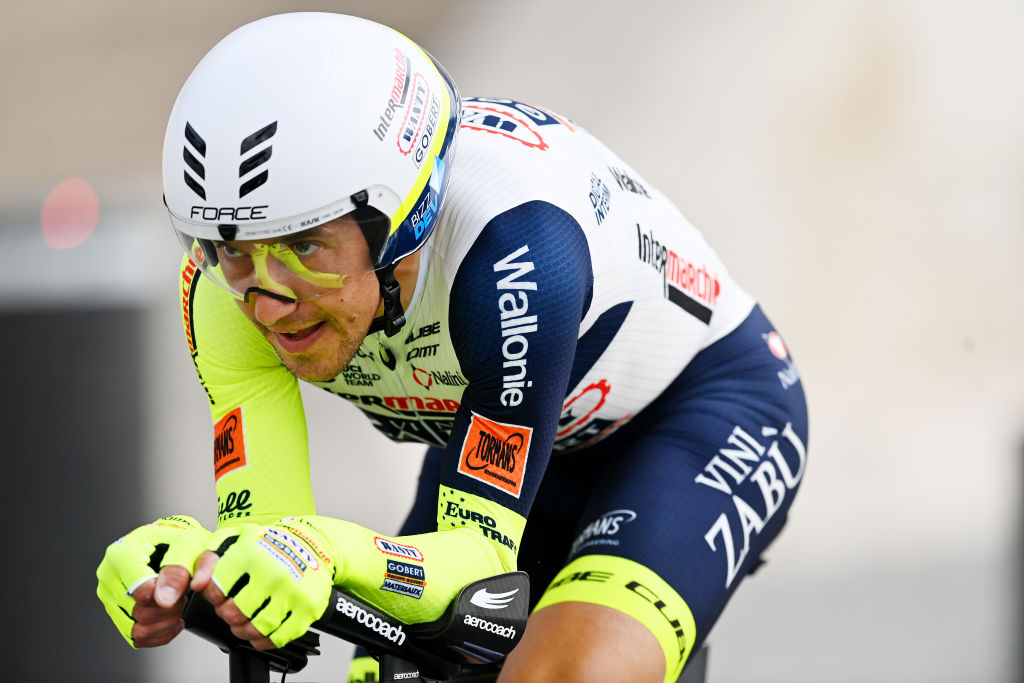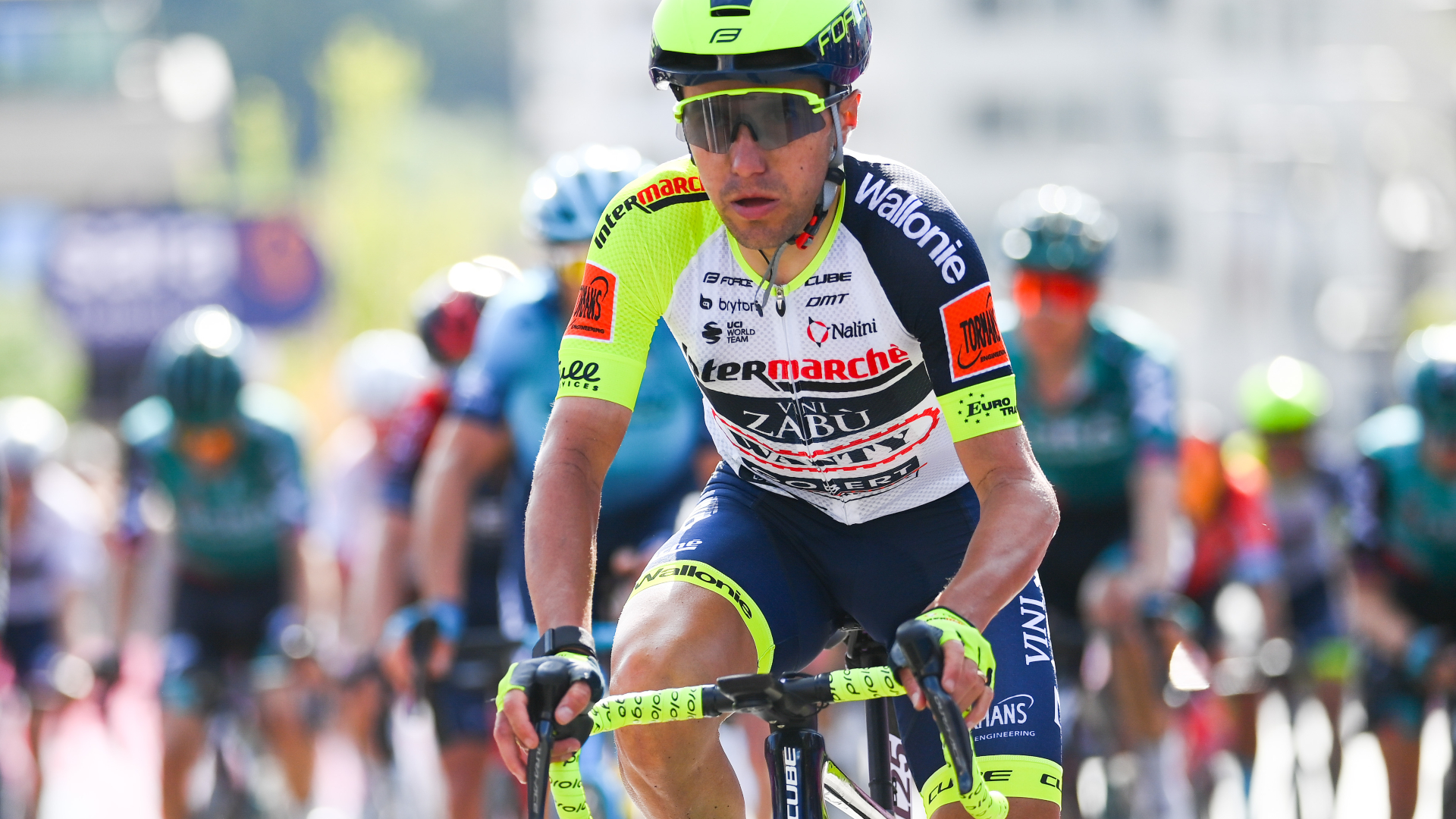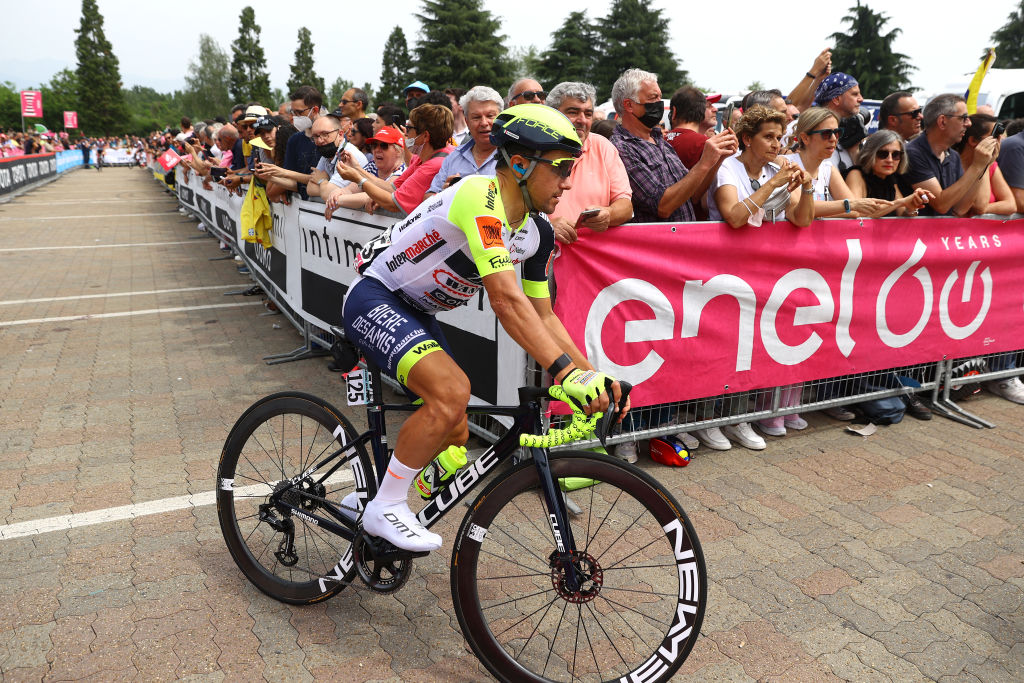'The doctors said it would be impossible to come back and race': The story of an incredible journey from hospital to Giro top five
Domenico Pozzovivo currently sits fifth in the GC ahead of a crucial week in the mountains, but his journey to this point has been a struggle

The latest race content, interviews, features, reviews and expert buying guides, direct to your inbox!
You are now subscribed
Your newsletter sign-up was successful
Heading into the last week of the Giro d’Italia, Domenico Pozzovivo (Intermarché-Wanty-Gobert Matériaux) sits fifth in the general classification. Just 1-01 behind the maglia rosa, he’s both Italy’s highest placed rider and its oldest, in this his sixteenth giri. It’s fair to say it’s a performance few saw coming. But defying expectations is nothing new for the 39-year-old from Policoro. In fact, he’s made a career of it.
In August 2019 while out training in Calabria in preparation for the Vuelta a España, he was hit head on by a car travelling on the wrong side of the road. His list of injuries read like a busy radiographer’s to-do list: fractured clavicle, fractured humerus, fractured left ulna, fractured right tibia and fibula. The inventory of damage went on.
Asked today about the number of broken bones he suffered and Pozzivivo had to pause before he answered.
“I broke around, umm, I don’t want to count really one by one because there are maybe some more ribs, but I broke around twenty bones and I underwent 16 operations,” he told Cycling Weekly, he's now the owner of several metal plates and even more screws as a result.
The impact left him broken but not defeated. While the doctors were sceptical, Pozzovivo vowed to return to cycling, telling La Gazzetta dello Sport at the time, “I will come back. You will see that I will make it.”
Of course, he did exactly that. But the effects of the accident linger on. At 5’5” and 53kg he’s the smallest of the Giro’s leading protagonists and cuts an unmistakable figure on the bike. Slightly hunched, his left shoulder and arm sits lower than the right, as though he’s forever reaching down for a downtube shifter that’s not there. For an old school rider like Pozzovivo it feels appropriate. It also serves as a constant reminder of what his body has been through and the sacrifices he continues to make.
“Yeah, I’m not really riding without pain,” he says during Monday’s rest day when asked if the injuries still affect him. “For sure, the lower back is the part that suffers more because of my leg and the movement of my left arm so I try to manage with the work of the osteopath and physiotherapist on my lower back.”
The latest race content, interviews, features, reviews and expert buying guides, direct to your inbox!
While it’s not quite as visceral as Fiorenzo Magni in the 1956 Giro biting down on a piece of inner tube attached to his bars to help mitigate the pain of riding with a broken collar bone, his discomfort on the bike is palpable.
However, Pozzovivo’s recent travails have not been limited to the accident. At the end of 2021 his then team Qhubeka NextHash folded. From the outside looking in it appeared that his career might be over. A late signing in February of this year to Belgian WorldTour outfit Intermarché-Wanty-Gobert provided a last-minute reprieve. But while it allowed Pozzovivo to continue riding it also meant acclimatizing to a new bike.
“From the start of the season I try to find a good position for me,” he says, “working on the position of the saddle because finding a good [saddle] height and angle of the saddle changes a lot my feeling of pain in my lower back.”
His dedication and determination continue to pay dividends. His current position in the GC equals his best finishes in the Giro, which he achieved in 2014 and 2018. The final stages appear to suit his climber credentials, with over 18,000 metres of elevation gain still to come. But the rarified air of both the mountains and a potential spot on the podium won’t cause the veteran to get giddy.

“I think I will continue on the same idea that I raced with until now, try to stay always with the best riders to the top of the climb,” he says when asked if he’s likely to defend or attack during the final week. “For sure if there’s some opportunity, like I wanted to try on Blockhaus [on stage nine], and if I find something I can try for an attack but I will not try to attack without the possibility to gain or to do something better on GC.”
“Last week we’ve already done some hard stages but for sure it will be an advantage for the climbers,” he continues. “I think I have some opportunities to improve my GC but it will be a very hard week and it will be important to keep a good level during every mountain stage.”
Experience might just be his ace card this week. This is his 22nd grand tour and he’s certainly not getting carried away, however pleased he is with his current position in the race.
“After my trouble last season I couldn’t imagine to be fifth in the last week of the Giro,” he says. “For me the real important thing was to be in a good place in GC, fighting for top-10, so I think I can be very happy about the situation now.”
To upset the riders ahead of him in the standing, Pozzovivo will have to call on his team to avoid being isolated in the high mountains. Ineos, Bora-Hangrohe, UAE Team Emirates and Bahrain-Victorious have already shown their strength in support of Richard Carapaz, Jai Hindley, Joao Almedia and Mikel Landa. Intermarché-Wanty-Gobert will likely be required to follow suit.
“The support from the climbers of our team has been very good until now,” Pozzovivo says of his new teammates Jan Hirt, Rein Taaramäe and Lorenzo Rota. “We have had very good communication since I started racing with them. I’m also starting to understand their potential and I think we can do very well in our last week. I think we can be on a high level on the next mountain stages.”

These stages start today with three category one climbs, including the Passo del Mortirolo and the Santa Cristina, a climb synonymous with Marco Pantani, who experienced triumph and tragedy on its slopes, winning in glorious fashion in 1994 as well as being ejected from the race here in 1999. But Pozzovivo points to both stage 19 and stage 20 as those most likely to affect the outcome of the race. Stage 19 dips into Slovenia to take in a new climb, the Kolovrat. Ten kilometers long with slopes around 10% it sounds nasty. Pozzovivo concurs.
“I didn’t go and recon this climb but I’ve asked some advice about it from Alessandro De Marchi (Israel–Premier Tech), who is from Friuli, so very close,” he says. “I think it’s a very hard climb, one of the hardest in the Giro.”
“For me the stage on the Marmolada will be the most important,” he continued. “But for sure, every day some team or some riders can also make the race crazy like we did in Torino.”
[These days] the pace is almost always full gas, with very few rest stages compared to 2005.
That frenetic stage is typical of the way races are today. With constant attacking from the flag, fissures became cracks and cracks became splits. The race was all over the road. Pozzovivo navigated the chaos successfully, finishing the day in fifth and losing just a handful of seconds to Carapaz and Hindley. Asked about how much the race has changed during his career and it’s clear the differences are pronounced.
“If I think about my first Giro in 2005 I know there have been a lot of changes in all the aspects of the race and also in the preparations,” he says. “Fifteen, sixteen years ago before the Giro I did one small training camp at altitude. Now before the Giro I have already done three big blocks of altitude. And also the race, the pace is almost always full gas, with very few rest stages compared to 2005.”
In the days ahead, Pozzovivo expects more of the same but also acknowledges that Ineos are vastly experienced at racing with the lead.
“From Bora I mostly expect some attacks because they already show a very strong team on the climbs,” he says. “But Ineos I think is a team that is very capable of controlling the race with the jersey.”
No matter what unfolds over the remaining stages, the pain that he still rides with also provides a source of strength, especially when he is required to dig deeper than usual.
“For sure I remember all the fractures and also the operations I have during my career,” he says. “Sometimes when I’m in trouble it gives me more motivation to do my best and also to go out of the pain because of what I suffer with this many operations was much more.”
The accident also continues to serve as a driving force for his ambitions. While he has nothing left to prove, the desire to finish inside the top ten of his home grand tour has acted as a proverbial carrot. Since his return to racing in 2020 he’s carded a DNF and an 11th in the corsa rosa.
After the accident I had in training the doctors said that it would be impossible to come back and race and also it could be difficult to just ride a bike
“For me it’s very important because after the accident I had in training the doctors said that it would be impossible to come back and race and also it could be difficult to just ride a bike,” he says. “So for me from then I started the challenge, and the challenge was to come back as a professional rider and to come back like I was before the accident, having the idea to finish the Giro and come back into the top-10.”
Whether he achieves his goal remains to be seen but regardless Pozzovivo has surely secured his place in the pantheon of great cycling comebacks, his suffering and resurrection another coat added to the sport’s myth-laden veneer. I tell him that in England we’d likely describe him as ‘hard as nails’ and ask whether there’s an Italian equivalent.
“In Italy we say ‘forte come una roccia’,” he says “But in this Giro it’s not, I think, I don’t know, I think maybe describing me completely in Italian.”
And of course he’s right. ‘Strong as rock’ is far too myopic a description for a rider who’s already displayed plenty of race craft alongside his granite-like determination. He’ll likely need plenty of both over the next few days.
Luke Friend has worked as a writer, editor and copywriter for over twenty five years. Across books, magazines and websites, he's covered a broad range of topics for a range of clients including Major League Baseball, Golf Digest, the National Trust and the NHS. He has an MA in Professional Writing from Falmouth University and is a qualified bicycle mechanic. He has been a cycling enthusiast from an early age, partly due to watching the Tour de France on TV. He's a keen follower of bike racing to this day as well as a regular road and gravel rider.